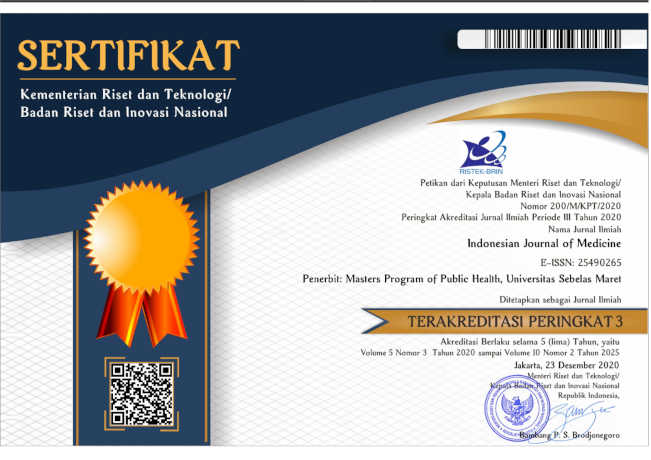Factors Influencing Events Dysfunction Cognitive Post Operation on Patient Elderly: Systematic Review
DOI:
https://doi.org/10.26911/theijmed.2025.10.3.871Abstract
Background: : Improvements in global life expectancy have led to a significant increase in the elderly population, which in turn results in a growing number of elderly patients undergoing surgery. This condition raises the risk of postoperative complications, such as postoperative cognitive dysfunction (POCD). POCD can reduce quality of life, prolong the length of hospital stay, and increase mortality. This study aims to identify and synthesize the factors that influence the occurrence of POCD in elderly patients.
Subjects and Method: This study is a Systematic review with PICO. The article used in research were obtained from several databased including Google Scolar, Scopus, and PubMed Keywords to find articles are "postoperative cognitive dysfunction," "elderly patients," and "geriatrics". This articles used are failing to directly discuss risk factors for postoperative cognitive dysfunction in elderly patients, or identified as opinion pieces, conference abstracts without full text, or narrative reviews, will be excluded. Articles were selected using PRISMA flow diagram.
Results: a total 8 articles reviewed in Systematic Review showed that The incidence of POCD in the elderly shows significant variation between studies, ranging from 8.33% to 37.7% . Risk factors that have been consistently identified as having a significant influence on the incidence of POCD include advancing age, low level of education, number of comorbidities, high ASA score, long duration of anesthesia, intraoperative hypotension, history of cerebral infarction, and low oxygen saturation at induction. The use of certain anesthetic agents such as sevoflurane and midazolam has also been shown to increase the risk of POCD. Instead, use dexmedetomidine preoperative, analgesia preemptive and the combination of general anesthesia with epidural block were identified as protective factors.
Conclusion: The main risk factors advanced age, education level, comorbidities, and type and duration of anesthesia.
Keywords:
anesthesia, elderly, pocd , risk factorsReferences
Arefayne NR, Berhe YW, van Zundert AA (2023). Incidence and factors related to prolonged postoperative cognitive decline (POCD) in elderly patients following surgery and anaesthesia: a systematic review. Healthcare (Basel). 11(21): 2877. doi: 10.3390/-healthcare11212877
Cartailler J, Loyer C, Vanderlynden E, Nizard R, Rabuel C, Coblentz Baumann L, Hourregue C, et al (2021). Determinants of post-operative cognitive decline in elderly people. J Prev Alz Dis. 3(8):322-328. doi: 0.14283/jpad.2021.13
Evered LA, Silbert BS (2018). Postoperative Cognitive Dysfunction and Noncardiac Surgery. Anesth Analg, 127 (2), 496–505. doi: 10.1213/ANE.0000000000003514
Fan Y, Liu X, Wu S, Liu Y (2021). The risk factors for cognitive dysfunction in elderly patients after laparoscopic surgery: A retrospective analysis. Medicine (United States), 100 (2), E23977. doi: 10.1097/MD.0000000-000023977
Farhan AB, Rehatta NM, Setiawati Y, Pudjirahardjo WJ (2021). Risk factor analysis of post-operating cognitive dysfunction in elderly patients. IJISRT. 6 (8). 679–684. www.ijisrt.-com
Grape S, Ravussin P, Rossi A, Kern C, Steiner LA (2021). Postoperative cognitive dysfunction. Eur J Anaes-thesiol. 38(2): 89–95. doi: 10.1016/j.-tacc.2012.02.002
Huang WWY, Fan S, Li WY, Thangavelu V, Saripella A, Englesakis M, Yan E, et al (2025). Prevalence of postoperative neurocognitive disorders in older non-cardiac surgical patients: A systematic review and meta-analysis. J Clin Anesth. 103: 111830. doi: 10.1016/-j.jclinane.2025.111830
Kotekar N, Shenkar A, Nagaraj R (2018). Postoperative cognitive dysfunction - current preventive strategies. Clin Interv Aging. 13: 2267–2273. doi: 10.2147/CIA.S133896
Li WX, Luo RY, Chen C, Li X, Ao JS, Liu Y, Yin YQ (2019). Effects of propofol, dexmedetomidine, and midazolam on postoperative cognitive dysfunction in elderly patients: A randomized controlled preliminary trial. Chin Med J. 132(4): 437–445. doi: 10.1097/CM9.000000-0000000098
Li Z, Zhu Y, Kang Y, Qin S, Chai (2022). Neuroinflammation as the underlying mechanism of postoperative cognitive dysfunction and therapeutic strategies. Front Cell Neurosci. 16: 843069. doi: 10.3389-/fncel.2022.843069
Li Y, Peng Q, Lu J, Hu L, Zhou H (2025). Cognitive change associated with anesthesia and surgery: an intro-duction to POCD for neuroscientists. J Integr Neurosci. 24(7): 36785. doi: 10.31083/JIN36785
Ling L, Yang TX, Lee SWK (2022). Effect of anesthesia depth on postoperative delirium and postoperative cognitive dysfunction in high-risk patients: a systematic review and meta-analysis. Cureus J Med Science. 14(10): e30120. doi: 10.7759/cureus.30120
Parami P, Ryalino C (2020). The incidence of postoperative cognitive dysfunction in elderly patients undergoing elective surgery at Sanglah General Hospital. Bali J. Anesthesiologu. 4 (6): S61–S63. doi: 10.4103/BJOA.BJOA_109_20
Putra IWAS, Dewi DAMS, Heryana KA, Suranadi IW (2024). The effect of general anesthesia on postoperative cognitive dysfunction in geriatric patients at the central general hospital. Medicina. 55 (3): 153–159. doi: 10.15562/medicina.v55i3.1358
Rundshagen I (2020). Postoperative cog-nitive dysfunction. Dtsch Arztebl Int. 111 (8): 119–125. doi: 10.3238/-arztebl.2014.0119
Shoair OA, Grasso MP, Lahaye LA, Daniel R, Biddle CJ, Slattum PW (2015). Incidence and risk factors for post-operative cognitive dysfunction in older adults undergoing major non-cardiac surgery: A prospective study. J Anaesthesiol Clin Pharmacol. 31(1): 30–36. doi: 10.4103/0970-9185.150-530
Skvarc DR, Berk M, Byrne LK, Dean OM, Dodd S, Lewis M, Marriott A, et al (2018). Post-operative cognitive dysfunction: an exploration of the inflammatory hypothesis and novel therapies. Neurosci Biobehav Rev 84: 116–133. doi: 10.1016/j.neubiorev.-2017.11.011
Somnuke P, Srishewachart P, Jirapho-rncharas C, Khempetch A, Weerani-than J, Suraarunsumrit P, Srinon-prasert V, et al (2024). Early postoperative neurocognitive compli-cations in elderly patients: com-paring those with and without pre-existing mild cognitive impairment– a prospective study. BMC Geriatr. 24(1): 1–12. doi: 10.1186/s12877-024-04663-5
Wu Y, Yu C, Gao F (2023). Risk factors for postoperative cognitive dysfunction in elderly patients undergoing surgery for oral malignancies. Perioper Med. 12(1): 1–9. doi: -10.1186/s13741-023-00330-2
Zeng K, Long J, Li Y, Hu J (2023). Pre-venting postoperative cognitive dys-function using anesthetic drugs in elderly patients undergoing noncar-diac surgery: a systematic review and meta-analysis. Int J Surg. 109(1): 21–31. doi: 10.1097/JS9.0000000000-000001
Zeng T, Lv J, Cui Y, Li XF, Zhang Q (2023). Effectiveness of dexmedetomidine on postoperative cognitive dysfunction in elderly patients with fracture: A systematic review. Medicine.102 (11): e31749. doi: 10.1097/MD.000000000-0031749
Zhao Q, Wan H, Pan H, Xu Y (2024). Postoperative cognitive dysfunction-current research progress. Front Behav Neurosci. 18, 1328790. doi: 10.3389/fnbeh.2024.1328790











